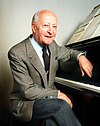Portal:The arts/Featured biography/May, 2009
Witold Lutosławski was one of the major European composers of the 20th century, and possibly the most significant Polish composer since Chopin. Lutosławski studied piano and composition in Warsaw, and during World War II he made a living in that city by playing the piano in bars. In the late 1940s and early 1950s his music was banned as formalist by the Stalinist authorities. In the last three decades of the century he became the pre-eminent musician of his country, and was presented with a large number of international honours, awards and prizes. Lutosławski's early compositions were overtly influenced by Polish folk music; from the late 1950s onwards he developed his own characteristically dense harmonies and innovative aleatory techniques. His works include four symphonies and a Concerto for Orchestra; he also composed concertos and song cycles for renowned musicians including Mstislav Rostropovich, Peter Pears, and Dietrich Fischer-Dieskau. He was also a notable conductor of his own music.

